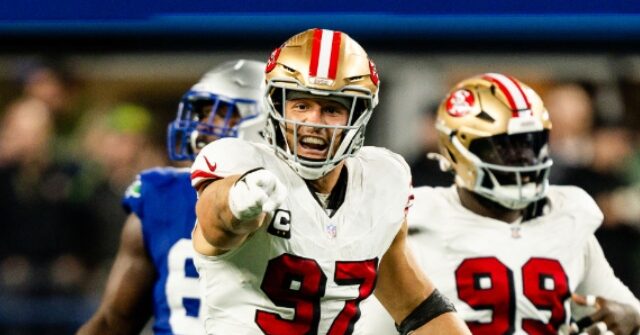San Francisco 49ers defensive end Nick Bosa has made headlines for his unapologetic support of Republican presidential nominee Donald Trump following an incident during a live TV interview where he showcased a “Make America Great Again” (MAGA) hat. The event, which occurred after a game, saw Bosa jumping into a broadcast between NBC sideline reporter Melissa Stark and 49ers quarterback Brock Purdy. This unexpected display attracted immediate backlash from leftist commentators who criticized him for his apparent political endorsement, igniting a wave of social media attacks aimed at the athlete. Bosa, however, seems undeterred by the outrage and stands firm in his beliefs.
Following the game, Bosa kept his comments about the MAGA hat brief, indicating he didn’t want to dwell on the matter too much but acknowledged the significance of the time. He expressed that it was an important moment, though he refrained from elaborating extensively in public forums. Instead, he took to social media to reflect on the incident, where he initially faced significant pushback from critics who were quick to resonate their displeasure over his actions. The backlash intensified, highlighting the contentious nature of political discussions in sports.
Despite the storm of criticism, Bosa has continued to assert his political stance. He proudly shared moments from the aforementioned incident on his Instagram stories, further solidifying his support for Trump. This boldness in the face of opposition exemplifies a growing trend among athletes who are increasingly vocal about their political beliefs, engaging their audiences in debates that often transcend the sports arena. Bosa’s actions underscore a divide in public opinion, illustrating how political views can impact an athlete’s image and popularity.
Moreover, Bosa’s MAGA hat moment was not just about personal expression but also about challenging the narrative that athletes should stay apolitical. This incident became a focal point of contention on social media, with a significant portion of fans supporting Bosa’s right to express his beliefs. In a media landscape often polarized by partisan views, the reaction to Bosa’s stunt revealed underlying tensions regarding political expression among athletes and the expectations of fans and organizations. The push and pull of these dynamics continue to shape the relationship between sports and politics.
The response from outlets, including the NFL’s Sunday Night Football, further illustrates the sensitivity surrounding such expressions. Initially, it appeared that the broadcast attempted to edit out Bosa’s MAGA hat moment, presumably to avoid exacerbating any potential backlash. However, fan outrage led to the reinstatement of the complete interview, showcasing the power of audience advocacy in sports media. This incident reflects a growing trend where fans actively engage in discussions that influence how media portray controversial topics, indicating a shift in consumer expectations regarding the intersection of sports and political expression.
In conclusion, Nick Bosa’s support for Donald Trump through his MAGA hat stunt has sparked a significant backlash from critics but also a wave of support from fans who resonate with his views. His actions have reignited conversations about the role of athletes in political discourse, as well as the reactions of media outlets in navigating these complex dynamics. As Bosa continues to share his perspective, it becomes clear that the dialogue surrounding politics in sports is far from over, and athletes like Bosa may continue to challenge societal norms regarding political expression. The evolution of these conversations will undoubtedly shape the landscape of sports as a platform for political expression in the future.

